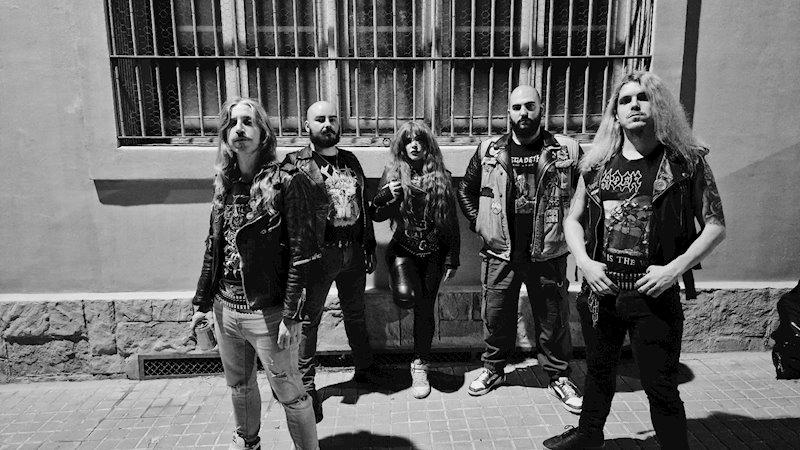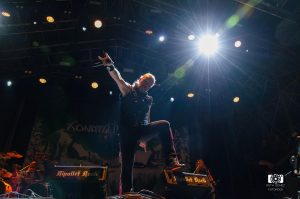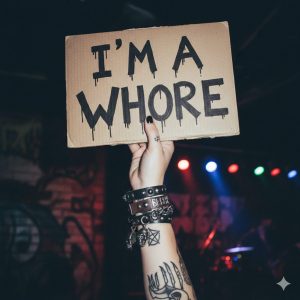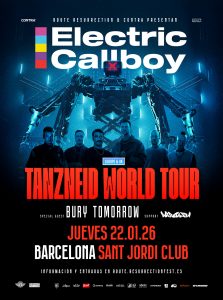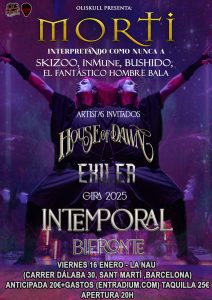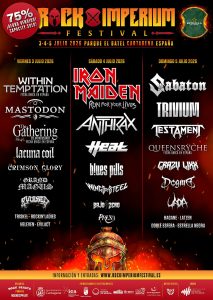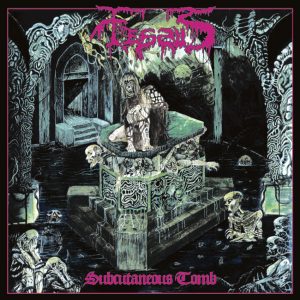WICKED LEATHER: Fierce Ones of Dark Metal: Between Monsters, Fears, and Revolution
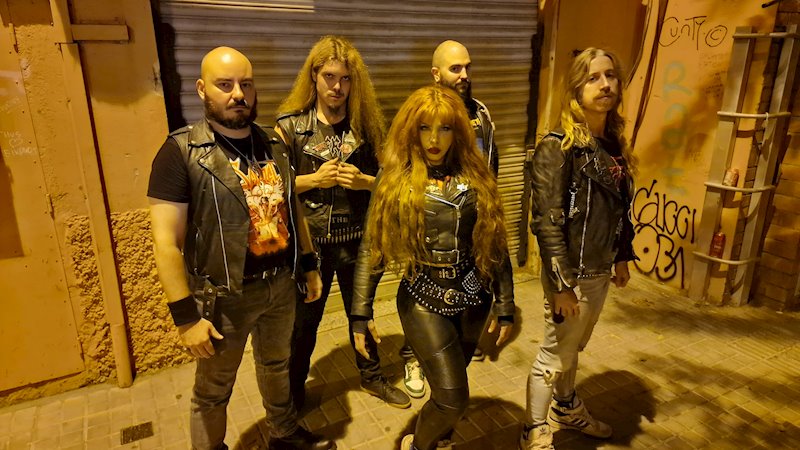
Dive into the visceral and captivating universe of Yami, the untamed voice behind Wicked Leather, the heavy metal band from Barcelona redefining the genre. In this interview, we explore how terror, feminine power, and the reinterpretation of classic legacy intertwine in their artistic proposal. From the life-death duality in their lyrics to the influence of ’80s cinema, Yami shares insights on music, fear, and monsters as creative engines. This is not just a dialogue about heavy metal—it’s an immersion into the depths of the human psyche and art.
– The name Wicked Leather not only evokes the classic rebellion of leather in the imagery of heavy metal but also has a dark, almost ritualistic undertone with the word “wicked.” How does this name connect with the tradition of the genre and your vision as a band? Is it also a nod to your way of reinterpreting that classic legacy?
The name Wicked Leather is like reinterpreting the classic with a dark edge. The name encapsulates the soul of the band. Indeed, there’s a clear homage to leather as an emblem of heavy metal, but “wicked” adds that dark, evil, and twisted layer that’s a part of us, connecting with our vision: honoring tradition while giving it a more sinister and defiant twist. We want to reinterpret the classic, but from our gut. We are that blend of the familiar and the dangerous.
– Your music deeply respects classic heavy metal but has a distinct stamp that makes it contemporary. How do you ensure your sound not only honors tradition but also opens new doors for the genre?
Our sound is rooted in classic heavy metal because we grew up with it. We aim to reinterpret, break molds, and pull people out of their comfort zones. We ensure that every riff, every vocal line, and every atmosphere has something personal, something that doesn’t sound like “I’ve heard this before.” It’s a balance between tribute and revolution. If you don’t open new doors or take the leap into the unknown, there’s no thrill, no adrenaline—and these are essential in metal.
– In your music, there are echoes of bands like Acid, not only in the sound but also in the tone of the lyrics. What influence do bands led by women have on your proposal? Which female references have marked you, Yami, in the creation of Wicked Leather?
Kate from Acid, without a doubt, and voices like Leather Leone or Wendy O. Williams are pillars that inspire us—not just musically but in their raw and authentic power. We’re very interested in how they broke stereotypes and claimed a space that seemed off-limits—not being the damsel in distress or something you’ve already heard before. These references remind us that we can create from the visceral, from the feminine, and still sound fiercer than thunder.
– Yami, being Argentinian and living in Barcelona surely impacts your perspective and creative identity. How does this experience influence the band’s dynamic and the way you approach universal themes from such a personal place?
For me, coming from Argentina and being in Barcelona has given me a hybrid perspective. Mind you, I lived many years in the United States, Uruguay, and other countries due to my parent’s work. I’ve always felt like I’m living on a bridge between worlds: not belonging to anything, yet everything belongs to you. This seeps into the lyrics and the band’s dynamics. Distance, uprooting, and cultural mixing add depth to what we do. Emotions are universal but also unique depending on the lens through which you observe them. This allows us to approach the personal and the universal with the same intensity, without limiting or defining ourselves.
– In fact, in Wicked Leather’s songs, terror is not just an aesthetic or narrative theme but a way to explore the hidden and the unknown—a topic historically linked to masculinity in heavy metal. By using terror, are you aiming to reconfigure that narrative of control and dominance to empower the female figure, both on stage and in the lyrics? How do you see the relationship between feminine power and the macabre, the sinister?
Terror, in the hands of heavy metal tied to masculinity, is a tool of power or control—to provoke fear, in a way. But I think I have a different vision: women use it to create, not to control. In that sense, the macabre serves us to reconfigure the narrative, placing the female figure at the center as a creative and destructive force—from the monster within. On stage or in the lyrics, that sinister power is ours, and we use it to empower. You can even fall in love with your fears and flirt with them a little. Why should terror be a masculine domain? It’s ours too.
– Fear is a recurring theme in your work. Do you see it as something to face, accept, or transform into something else? What have you learned from working with fear as an artistic theme?
For me, fear is seductive. When I was little, everything that scared me attracted me, and I started exploring my own limits of being afraid. And every time, that feeling made me feel stronger. But… we don’t just want to face fear; we want to live it, explore its cracks. By using it as an artistic theme, we’ve learned that fear has many faces: it’s a tool, a mirror, and sometimes a monster you can caress and touch. It’s a powerful resource because it connects us to what’s most human and most primal.
– The visceral energy of your music, and especially of the vocals, seems loaded with personal emotions. Do you see Wicked Leather as a vehicle to process or transform your own experiences and emotions? Does Wicked Leather, or art, have something cathartic about it?
Of course, Wicked Leather has something cathartic. Everything we do is loaded with personal experiences and emotions, transformed into something collective. Getting on stage is like screaming into the void and having it scream back at you. It’s a purge but also an affirmation. If you don’t put your soul into this, it doesn’t work. It’s as simple as that.
– “Night Hunter,” from your debut EP, evokes an atmosphere full of mystery and menace. Beyond the horror it reflects, what personal, historical, or cultural monsters—or entities—inspired its narrative? Do you think these monsters are metaphors for internal struggles or social critiques?
“Night Hunter” was born from a fascination with those internal and external monsters that haunt us. These hunters can be a social critique, a personal trauma, or a shadow that lives within us all. Historical monsters? Absolutely. Personal ones? Without a doubt. We all have scars, and we all have a bit of monster in us. We use them as metaphors to explore and understand ourselves better. There’s no horror more real than the one we carry inside.
– The duality between life and death in “Lightning Strike” resonates with ideas like Jung’s about integrating opposites. How do you explore this duality in music? Is it a theme that also impacts you personally or creatively?
Life and death are two sides of the same coin, and that duality is something that obsesses us. Fighting or struggling against our shadow is about coming to terms with this duality—not just philosophically but viscerally. Music is perfect for exploring that tension, and we feel that when you manage to integrate both opposites, something powerful happens. Personally, that duality impacts us all the time: creation and destruction go hand in hand. The death drive often transforms into art, into creation, and therefore into life.
– ’80s horror cinema is present in your music, but there’s also a rawness that goes beyond the visual. What draws you to this genre as a medium to explore complex human emotions, and how does it influence the narrative of songs like “Night Hunter”?
’80s horror cinema has something special: its rawness, its lack of filters. The beauty of the grotesque. That resonates with what we do because we don’t want to polish things too much; we want them to feel real and human. We’re interested in how terror explores complex emotions, how it can be grotesque and beautiful at the same time. In songs like “Night Hunter,” that direct influence is noticeable.
– What are your favorite horror movies and books? Recommend something we might not know.
From Stephen King, The Stand is a masterpiece exploring the struggle between good and evil. If you want something less known, try The Damnation Game by Clive Barker (Hellraiser)—a gem of discomfort. In cinema, we recommend In the Mouth of Madness (1994) by John Carpenter: disturbing and unique. If you like the edge between horror and madness, you’ll love it.
– That’s all. Thanks again for your time. If there’s anything you’d like to add to close, the last lines are yours.
Thank you for this interview filled with life (and death). We want Wicked Leather to be a refuge and a cry for those who feel like us. If you dare, keep flirting with fear, because it has much to teach us—especially about ourselves.

